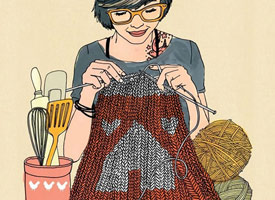When I was in my late twenties, a 30-year-old acquaintance told me she was pregnant. In most populations, this would be considered a fairly normal occurrence, and the proper response would include one part squealing and two parts envy. But my immediate response was not to ask the due date or inquire about possible names. My immediate response was shock: wow, babies having babies. Let me repeat: she was 30. If this were a Jane Austen novel, a 30-year-old woman would already be a mother of four or an avowed spinster with an unhealthy interest in cribbage. And if this were Paleolithic times, a 30-year-old woman would, statistically speaking, be dead. But like many urban women under 30, I still believed that ovaries were entirely ornamental and that real life was something that happened tomorrow.
I wasn’t the only person under this delusion. Few of my New York friends were married, let alone packing diapers. And despite our claims that we lived in New York because we were so career oriented, we mostly dabbled in professional life without much direction. We all claimed that we were working in administrative positions because we wanted to write or direct or act, but, with very few exceptions, no one actually did any of these things. In theory, we were all very creative. In reality, we mostly just went to brunch. We existed in a perpetual post-college phase—a term that seemed increasingly ridiculous when we started receiving notices for our ten-year-high-school reunions. Even though we logically knew our parents were settled into careers and families by our age, we still considered ourselves firmly within our salad days. But then 30 hit, and something started to shift. Continue reading “Spoiler Alert: You’re Old”








